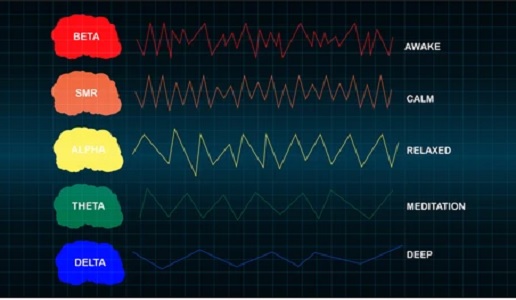What are brain waves types and frequencies

The brain is one of the most important elements to ensure the proper functioning of our vital functions. In fact, it is so important that any problem in this organ could interfere with our daily life. Medicine has been interested in understanding how it works in detail, conducting hundreds of investigations with the aim of making visible the main mechanisms at work in the processes it performs. In this article we will provide you information about brain waves with their types and frequencies.
The complexity of the human mind can push us to unimaginable limits. For this reason, research on her continues to this day. In this Psychology-Online article we will provide you with information about the types of brain waves.
What are brain waves
Before explaining what brain waves are , it is important to understand how neuronal communication occurs. In general, neurons in the brain connect to each other through a process called synapses, which involves the transmission of information by chemicals. This procedure is repeated each time two neurons communicate through their endings.
In this way, the synapse gives rise to brain waves, which consist of electrical impulses of varying intensities. Likewise, this fact denotes differences in the speed of information processing, as some brain waves can be faster and others slower.
Types and frequencies of brain waves
1-Gamma waves
Gamma brain waves are the electrical impulses with the highest frequency. Generally speaking, the gamma brain wave ranges from 25 to 100 Hz, although its most common frequency is 40 Hz.
Gamma waves are associated with the perception of stimuli during states of consciousness, as in these cases the possibility of focusing attention is greater than in other situations. In turn, this type of brain wave allows the processing of information related to tasks of considerable cognitive demand.
2-Beta waves
These brain waves are not as intense as gamma waves. However, its frequency varies from 12 to 33 Hz in intensity. What are beta waves for? Beta brain waves occur when high-functioning cognitive activities that require specific skills and abilities are done.
Also, a high focus of attention appears here as a high degree of concentration is required on the part of the person. Examples of such activities could be public speaking or giving a speech, among others.
3-Alpha waves
Alpha waves are electrical signals that have an intermediate frequency, with an intensity between 8 and 13 Hz. What are alpha waves for? Unlike the brain waves explained above, alpha waves occur in states of mental and bodily relaxation.
For this reason, the main function of this type of brain wave is to give reassurance warnings in certain situations that require it. In this way, alpha waves can occur, for example, in moments of meditation or during reactive activities.
4-Theta waves
What is the theta frequency? This type of brain wave has a lower intensity than those mentioned above, with a general range from 3.5 to 7.5 or 8 Hz. Theta waves promote body relaxation and are responsible for intervening in the moments before falling asleep.
For this reason, the functioning of theta waves is vital for prolonging moments of relaxation throughout life.
5-Delta waves
Finally, delta waves are the lowest type of brain waves. These electrical signals have a low frequency, oscillating between 1 and 3 Hz, resulting in moments of deep mental and bodily relaxation in people .
Delta waves affect many vital functions that are performed involuntarily, such as regulating heart rate, blood pressure, respiratory rate or the deep sleep cycle, among others. Delta waves may, therefore, be indirectly related to the decrease in alertness produced by the body in stressful situations.